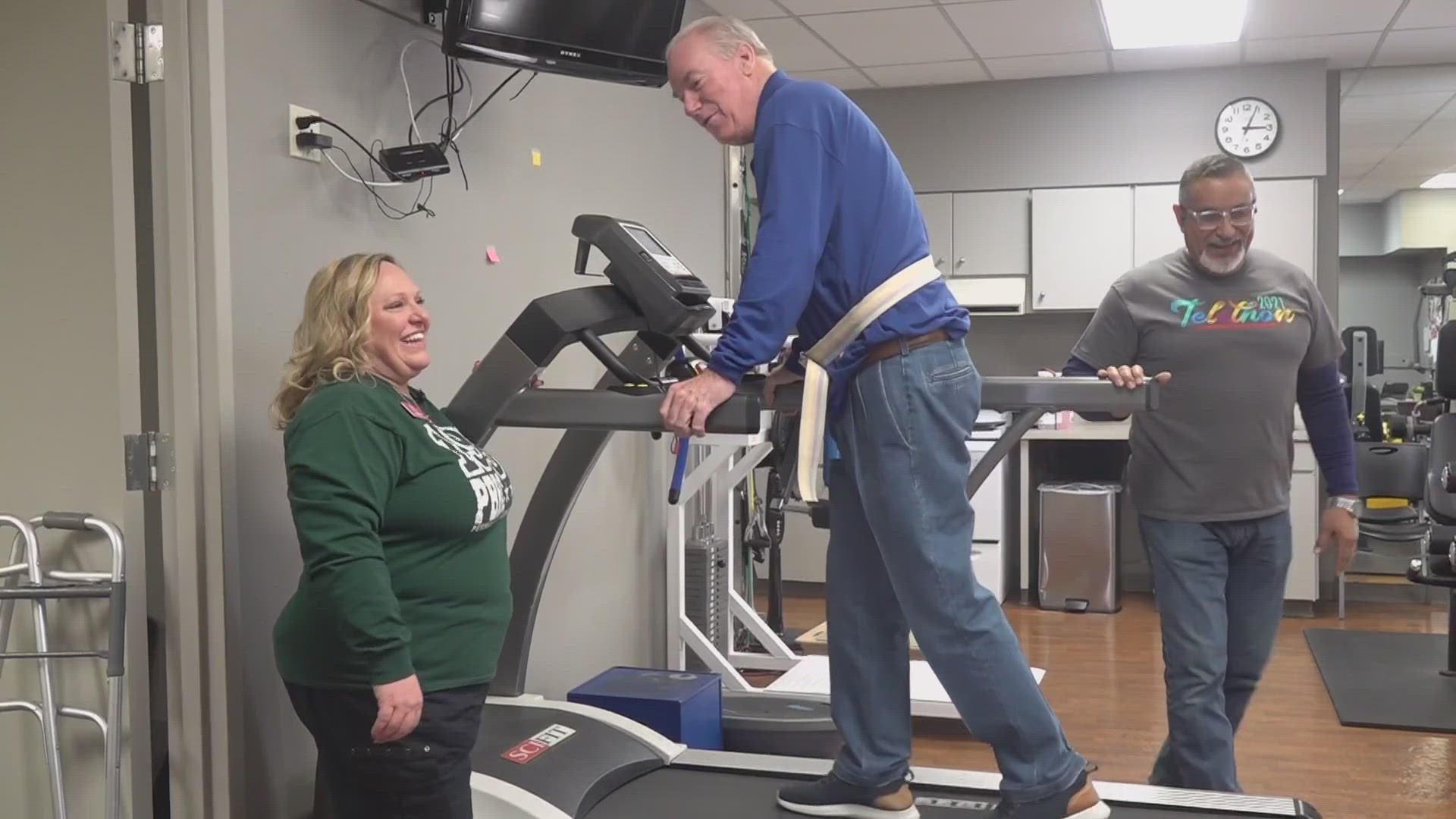ODESSA, Texas —
Tim Edgemon and his wife Theresa have been faithful supporters of the Permian Basin Rehab Center for many years.
"I've participated and supported the rehab center,” said Edgemon. “I've been here all my life. With the Crystal Ball, we've always contributed to that, attended that when my kids were there. The Telethon, we always called in. But never did I think…"
Who would have thought that a family ski trip would end in tragedy and Tim, one day, needing the help of the center he so faithfully supported.
One year ago, on Christmas Eve, while on that ski trip, Tim slipped on some ice. He fell and hit the back of his head.
After that, everything went numb.
"I don't remember ever losing consciousness,” said Edgemon. “I felt everything go numb, of course I was on ice, so I slipped down and hit the front wheel of a car. My daughter was there and said, ‘get me help! I'm in trouble! I can't feel anything!’"
He was taken to a hospital in Taos, then airlifted to University Medical Center in Lubbock, where he was diagnosed with a spinal injury from C3 to C7.
The scars are still very visible from the surgery that was performed.
After which, Tim underwent intensive therapy at a neurorehabilitation center, before coming to PBRC.
“Everyone said, ‘you need to go to the rehab center.’ So here I am,” said Edgemon.
Tim gets physical therapy to work on walking, balance and strength.
Physical therapy assistant Amy Burks said Tim's injury is trickier than most, because it's nerve related. So basically, Tim has to start from the beginning, with help from walkers, crutches and sometimes, if needed, a wheelchair.
“I think, for him, he's more frustrated about the walking,” said Burks. “Whereas a kid, you teach them to walk, they take their first steps, then you advance them to running and stepping over. His is a slower process, he wants to be mobile and independent.”
Tim also gets occupational therapy to work on his hands. Occupational therapist Madison Campbell is new to the rehab center, and Tim is the only adult on her case load.
"The biggest thing with me, when I started with Tim was his range of motion with all extremities,” said Campbell. “So, finger, wrist, elbow and shoulder range of motion. That's gotten significantly better since then. Another thing we've been working on is strength. It has gotten better.”
Tim looks back on the days, and the many ways he supported PBRC in the past.
"I never thought that I, one, would be in this position, but I didn't know this was a place for adults,” said Edgemon.
Tim is not your typical patient. He's quite a bit older than the others, but Burks and Campbell agree, he's got one thing working for him.
"He's a perfectionist,” said Campbell. “He wants to be 110%, two days ago. He's just going to have to understand, it takes time.”
"It's hard to make somebody want it as bad as you want it,” said Burks. “And he has that. We don't have to jump that hurdle. He's already got that innate desire to get better. So, we just have to tap into that and push.”
And by tapping and pushing, his therapists have been able to check things off their progress lists. Even with occasional setbacks that have to be overcome, they're on track to get Tim back in shape.
"I’ve come a long way, from numb from the neck down, to this point” said Edgemon. “We're real close to walking without the walker or crutches. Probably on a cane for a little while. It's been a long journey. But all I have to do is think about where I was a year ago, today.”
Now, he has more than one reason to sing the praises of the Permian Basin Rehab Center.
"It's a wonderful thing, what we do for these kids,” said Edgemon. “It's tough, to sit in that lobby, in fact, my wife doesn't. She sits in the car and waits on me, because when you see these little kids walk out of here, it will tear your heart strings, I promise you. Some of them may never walk, like I do. That's what I've always thought, and I've sent my money, it was for the kids, because when you see that, it will touch you. It will touch your heart, and you'll want to do something. Little did I know that one day I would be coming up here. I can't say enough for the therapists. Until you experience it, you really don't realize. Here I am, working and complaining about it and I see a 3 or 4 year old, go out with a little tricycle made for them, cause that's the only way they can walk, and sitting there knowing that may be the only way they'll ever walk, it'll make you think twice.”

